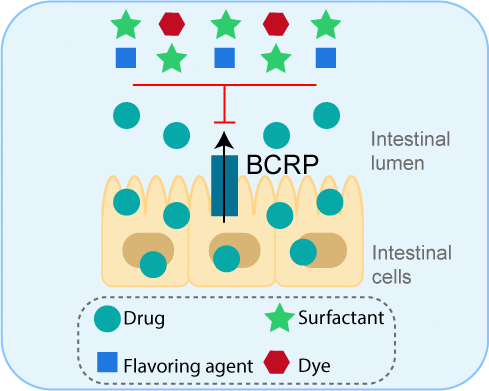当前位置:
X-MOL 学术
›
Mol. Pharmaceutics
›
论文详情
Our official English website, www.x-mol.net, welcomes your
feedback! (Note: you will need to create a separate account there.)
Interactions of Oral Molecular Excipients with Breast Cancer Resistance Protein, BCRP.
Molecular Pharmaceutics ( IF 4.5 ) Pub Date : 2020-01-28 , DOI: 10.1021/acs.molpharmaceut.9b00658 Ling Zou 1 , Joshua Pottel 2 , Natalia Khuri 3 , Huy X Ngo 1 , Zhanglin Ni 4 , Eleftheria Tsakalozou 4 , Mark S Warren 5 , Yong Huang 5 , Brian K Shoichet 2 , Kathleen M Giacomini 1
Molecular Pharmaceutics ( IF 4.5 ) Pub Date : 2020-01-28 , DOI: 10.1021/acs.molpharmaceut.9b00658 Ling Zou 1 , Joshua Pottel 2 , Natalia Khuri 3 , Huy X Ngo 1 , Zhanglin Ni 4 , Eleftheria Tsakalozou 4 , Mark S Warren 5 , Yong Huang 5 , Brian K Shoichet 2 , Kathleen M Giacomini 1
Affiliation

|
Mechanistic-understanding-based selection of excipients may improve formulation development strategies for generic drug products and potentially accelerate their approval. Our study aimed at investigating the effects of molecular excipients present in orally administered FDA-approved drug products on the intestinal efflux transporter, BCRP (ABCG2), which plays a critical role in drug absorption with potential implications on drug safety and efficacy. We determined the interactions of 136 oral molecular excipients with BCRP in isolated membrane vesicles and identified 26 excipients as BCRP inhibitors with IC50 values less than 5 μM using 3H-cholecystokinin octapeptide (3H-CCK8). These BCRP inhibitors belonged to three functional categories of excipients: dyes, surfactants, and flavoring agents. Compared with noninhibitors, BCRP inhibitors had significantly higher molecular weights and SLogP values. The inhibitory effects of excipients identified in membrane vesicles were also evaluated in BCRP-overexpressing HEK293 cells at similar concentrations. Only 1 of the 26 inhibitors of BCRP identified in vesicles inhibited BCRP-mediated 3H-oxypurinol uptake by more than 50%, consistent with the notion that BCRP inhibition depends on transmembrane or intracellular availability of the inhibitors. Collectively, the results of this study provide new information on excipient selection during the development of drug products with active pharmaceutical ingredients that are BCRP substrates.
中文翻译:

口服分子辅料与乳腺癌抗性蛋白BCRP的相互作用。
基于机械理解的赋形剂选择可能会改善仿制药产品的配方开发策略,并有可能加速其批准。我们的研究旨在调查口服给予FDA批准的药物产品中存在的分子赋形剂对肠道外排转运蛋白BCRP(ABCG2)的影响,该物质在药物吸收中起关键作用,可能对药物安全性和功效产生潜在影响。我们确定了分离的膜囊泡中136种口服分子赋形剂与BCRP的相互作用,并使用3H胆囊收缩素八肽(3H-CCK8)确定了26种赋形剂为BCRP抑制剂,IC50值小于5μM。这些BCRP抑制剂属于赋形剂的三个功能类别:染料,表面活性剂和调味剂。与非抑制剂相比,BCRP抑制剂具有明显更高的分子量和SLogP值。还以相似的浓度在过表达BCRP的HEK293细胞中评估了在膜囊泡中鉴定的赋形剂的抑制作用。在囊泡中鉴定的26种BCRP抑制剂中,只有1种抑制BCRP介导的3H-氧嘌呤醇摄取超过50%,这与BCRP抑制依赖于抑制剂的跨膜或细胞内可用性的观点一致。总体而言,这项研究的结果为开发具有活性药物成分(即BCRP底物)的药物产品过程中的赋形剂选择提供了新信息。还以相似的浓度在过表达BCRP的HEK293细胞中评估了在膜囊泡中鉴定的赋形剂的抑制作用。在囊泡中鉴定的26种BCRP抑制剂中,只有1种抑制BCRP介导的3H-氧嘌呤醇摄取超过50%,这与BCRP抑制依赖于抑制剂的跨膜或细胞内可用性的观点一致。总体而言,这项研究的结果为开发具有活性药物成分(即BCRP底物)的药物产品过程中的赋形剂选择提供了新信息。还以相似的浓度在过表达BCRP的HEK293细胞中评估了在膜囊泡中鉴定的赋形剂的抑制作用。在囊泡中鉴定的26种BCRP抑制剂中,只有1种抑制BCRP介导的3H-氧嘌呤醇摄取超过50%,这与BCRP抑制依赖于抑制剂的跨膜或细胞内可用性的观点一致。总体而言,这项研究的结果为开发具有活性药物成分(即BCRP底物)的药物产品过程中的赋形剂选择提供了新信息。
更新日期:2020-02-11
中文翻译:

口服分子辅料与乳腺癌抗性蛋白BCRP的相互作用。
基于机械理解的赋形剂选择可能会改善仿制药产品的配方开发策略,并有可能加速其批准。我们的研究旨在调查口服给予FDA批准的药物产品中存在的分子赋形剂对肠道外排转运蛋白BCRP(ABCG2)的影响,该物质在药物吸收中起关键作用,可能对药物安全性和功效产生潜在影响。我们确定了分离的膜囊泡中136种口服分子赋形剂与BCRP的相互作用,并使用3H胆囊收缩素八肽(3H-CCK8)确定了26种赋形剂为BCRP抑制剂,IC50值小于5μM。这些BCRP抑制剂属于赋形剂的三个功能类别:染料,表面活性剂和调味剂。与非抑制剂相比,BCRP抑制剂具有明显更高的分子量和SLogP值。还以相似的浓度在过表达BCRP的HEK293细胞中评估了在膜囊泡中鉴定的赋形剂的抑制作用。在囊泡中鉴定的26种BCRP抑制剂中,只有1种抑制BCRP介导的3H-氧嘌呤醇摄取超过50%,这与BCRP抑制依赖于抑制剂的跨膜或细胞内可用性的观点一致。总体而言,这项研究的结果为开发具有活性药物成分(即BCRP底物)的药物产品过程中的赋形剂选择提供了新信息。还以相似的浓度在过表达BCRP的HEK293细胞中评估了在膜囊泡中鉴定的赋形剂的抑制作用。在囊泡中鉴定的26种BCRP抑制剂中,只有1种抑制BCRP介导的3H-氧嘌呤醇摄取超过50%,这与BCRP抑制依赖于抑制剂的跨膜或细胞内可用性的观点一致。总体而言,这项研究的结果为开发具有活性药物成分(即BCRP底物)的药物产品过程中的赋形剂选择提供了新信息。还以相似的浓度在过表达BCRP的HEK293细胞中评估了在膜囊泡中鉴定的赋形剂的抑制作用。在囊泡中鉴定的26种BCRP抑制剂中,只有1种抑制BCRP介导的3H-氧嘌呤醇摄取超过50%,这与BCRP抑制依赖于抑制剂的跨膜或细胞内可用性的观点一致。总体而言,这项研究的结果为开发具有活性药物成分(即BCRP底物)的药物产品过程中的赋形剂选择提供了新信息。











































 京公网安备 11010802027423号
京公网安备 11010802027423号